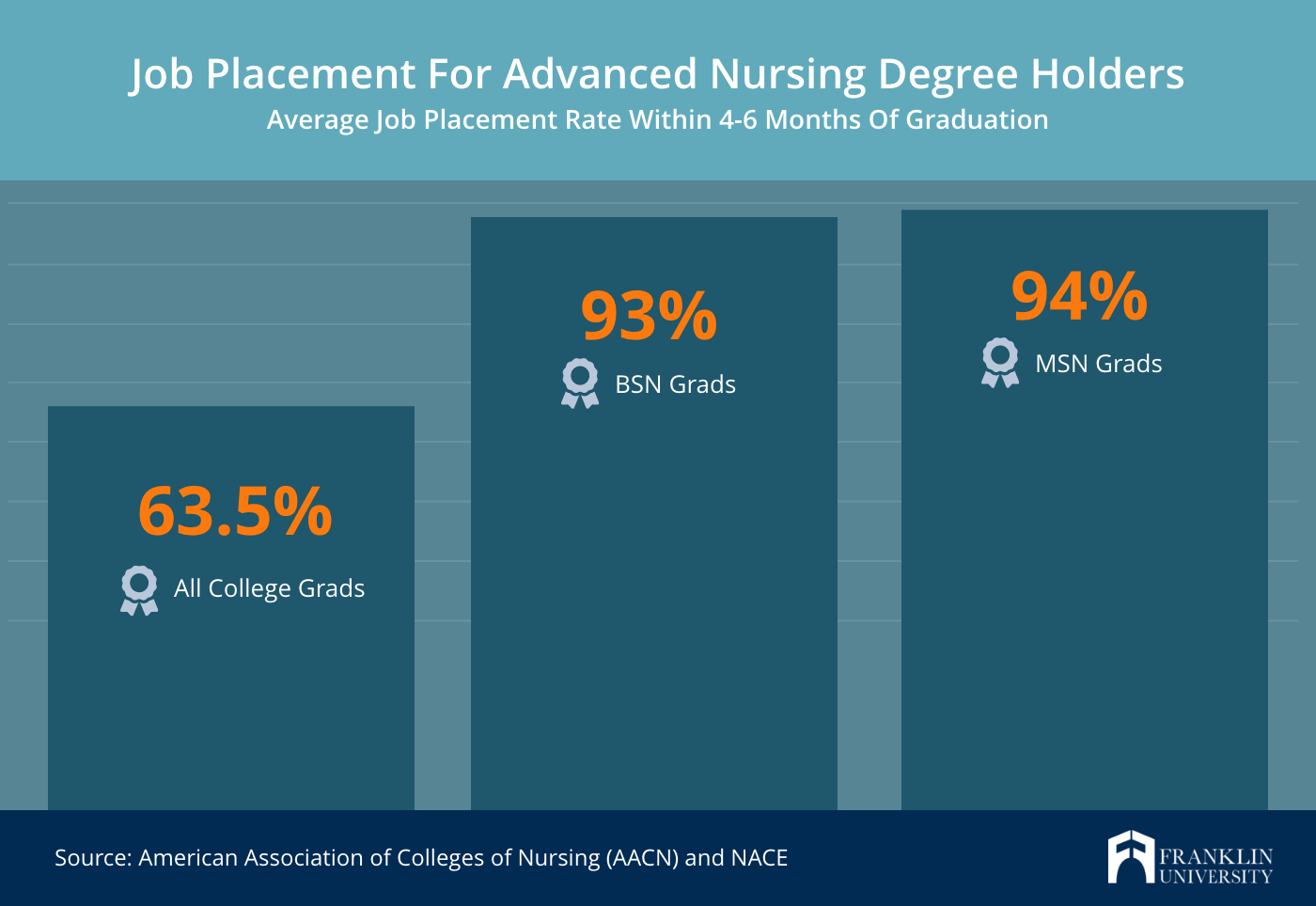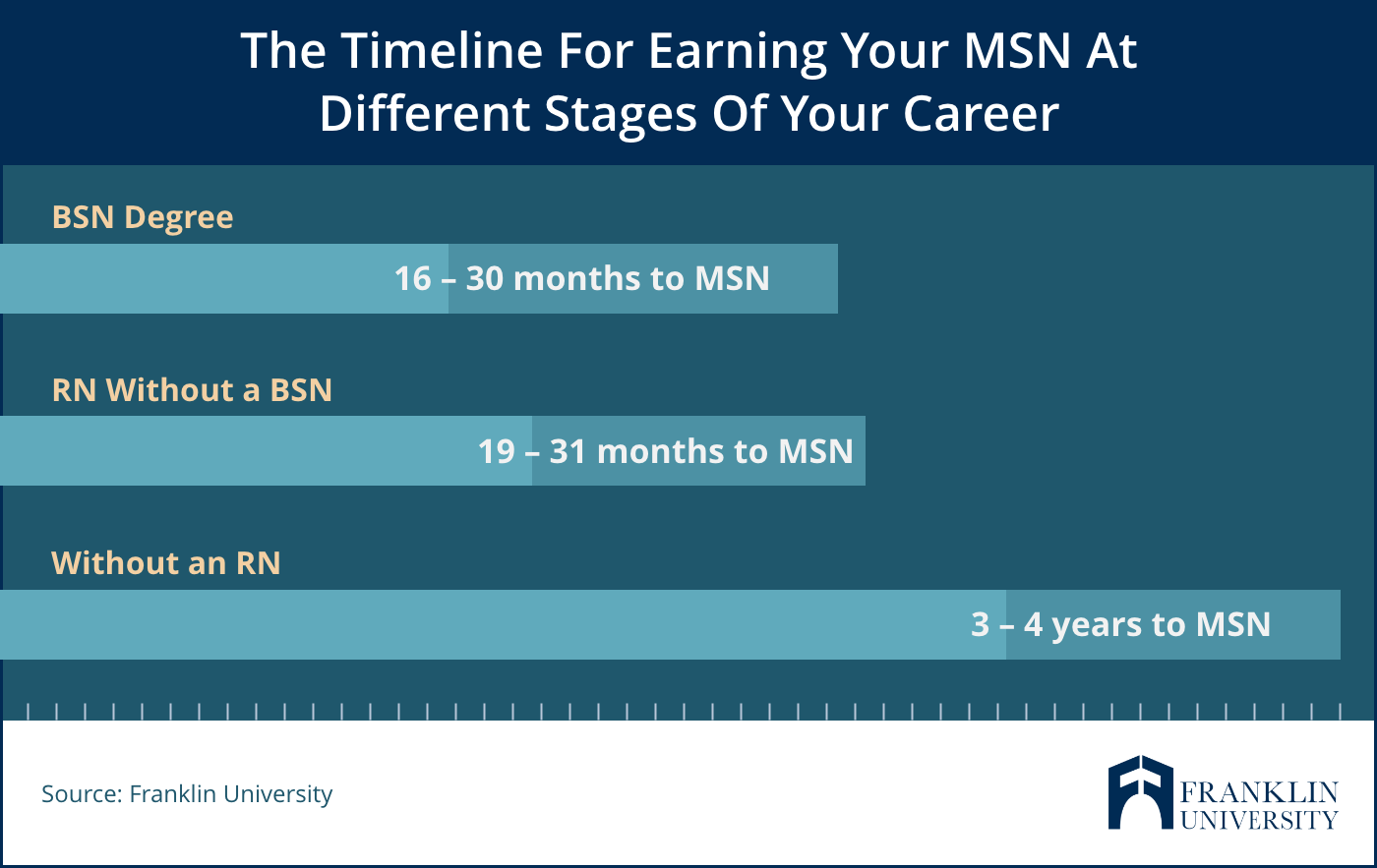Request Information
We're Sorry
There was an unexpected error with the form (your web browser was unable to retrieve some required data from our servers). This kind of error may occur if you have temporarily lost your internet connection. If you're able to verify that your internet connection is stable and the error persists, the Franklin University Help Desk is available to assist you at helpdesk@franklin.edu, 614.947.6682 (local), or 1.866.435.7006 (toll free).
Just a moment while we process your submission.

How Long Is An MSN Program?
Today’s nurses are expected to take on an expanded scope of practice and serve as organizational leaders.
As a result, healthcare organizations have a strong preference for hiring nurses with advanced degrees. A 2021 survey from the American Association of Colleges of Nursing (AACN) found that within 6 months of graduation, 93% of nurses with a bachelor’s degree and 94% of nurses with a master’s degree were offered a job, well above the average job offer rate for all college graduates.

As demand for highly educated nurses increases, a master’s degree in nursing can help you stand out from other applicants and position you as a nurse leader. Earning your master’s degree in nursing, or MSN, will certainly require hard work and dedication. However, the degree may be more achievable than you think.
This guide will break down how long it takes to earn your MSN degree and answer your questions head on.
Get a FREE guide to help you advance your career, featuring helpful advice and thoughtful insights from nursing experts.
Paths To Earning Your MSN Degree: How Long It Takes Based On Your Nursing Experience

Whether you’re already a registered nurse or you’re looking to break into the field, you may be considering earning a master’s in nursing as a powerful way to advance your career. The timeline for earning your master’s varies based on the path you take.
Let’s look at the different paths to an MSN degree based on your education and experience.
Bachelor of Science in Nursing (BSN) to MSN Timeline
If you already have a Bachelor of Science in Nursing (BSN), you can qualify for an MSN program. Depending on which program you choose and how many clinical hours are required, you can usually earn an MSN degree in 2 years.
Franklin University's MSN program offers several specialization tracks that can be completed in as few as 16 to 28 months, thanks to built-in clinical practice hours that you earn while completing coursework.
- The Nurse Administrator (MSN-ADM) program is a leadership pathway for nurses who want to move beyond the clinical setting and focus on managing teams and providing strategic planning. Franklin’s MSN-ADM degree can be completed in as few as 16 months.
- Master of Science in Nursing (MSN-Generalist) programs are flexible degrees that enable you to take on a specialization in the nursing field, become a nurse educator or work toward a doctorate in nursing. Franklin’s MSN-Generalist degree can be completed in as few as 18 months.
- Family Nurse Practitioner (MSN-FNP) programs prepare nurses to provide primary care services and treatment to a wide variety of patient populations. Franklin’s MSN-FNP degree can be completed in as few as 27 months.
- Adult-Gerontology Primary Care Nurse Practitioner (AGPCNP) programs provide specialization in the adult and geriatric population, equipping nurses to help prevent illness and treat chronic diseases. Franklin’s AGPCNP degree can be completed in as few as 28 months.
- Psychiatric Mental Health Nurse Practitioner (MSN-PMHNP) programs prepare nurses to provide holistic care to improve patients’ mental health. Franklin’s MSN-PMHNP degree can be completed in as few as 28 months.
Those looking to become a nurse practitioner should understand that a master’s program qualifies you to sit for licensure. The scope of practice varies by state, so it’s important to be familiar with licensing in the state in which you want to practice.
RN to MSN Timeline: Fast-Track Your Master’s in Nursing
If you don’t already have a BSN, an accelerated program is one of the best ways to reduce the time and cost of a degree. Some universities, such as Franklin University, offer an accelerated RN to MSN program where you don’t need to complete your BSN before enrolling in an MSN program.
For registered nurses with a nursing diploma or an Associate Degree in Nursing (ADN), Franklin’s RN to MSN program allows you to qualify for an MSN after completing a fast 12-week online bridge course. Students can then go on to enroll in the MSN track of their choice.
Including the bridge course, students can complete the RN to MSN program in as few as 19 to 31 months.
High School Graduate or Career Changer Without an RN
If you are not a registered nurse, there’s no direct path to earning your MSN degree. You must first complete a registered nurse program, such as a nursing diploma, Associate Degree in Nursing (ADN) or BSN.
Both an ADN or BSN degree prepare students to earn a license as a registered nurse and enroll in an RN to MSN accelerated program.
Let’s look at the shortest possible path to completing your MSN if you are not a registered nurse:
- 1.5 to 2 years to complete your ADN and become an RN
- 1.5 to 2 years to complete an RN to MSN program after earning your ADN
Four Tips for Successfully Completing Your Master’s in Nursing
Earning an advanced nursing degree is a significant undertaking, but it positions you to lead organizations in addressing growing healthcare demands. No matter which degree path you choose, follow these tips to help you successfully complete your master’s degree.
- Choose an online program tailored to meet your busy work schedule. Bedside nurses commonly work long shifts around the clock and on weekends. Online courses offer the flexibility to help you earn your degree while balancing your busy schedule.
- Pace your coursework strategically. Hospitals are placing a stronger emphasis on achieving Magnet status, the highest credential awarded to nursing facilities. A major component of Magnet status is the staff education level, and as a result, many organizations offer tuition assistance to help nurses earn advanced degrees. Though each organization is different, most won’t reimburse more than a set budget per year to avoid paying additional taxes. Make sure you pace your coursework in a way that maximizes your employer’s reimbursement plan to help save money in the long run.
- Earn your MSN now, even if you don’t plan to use it until later. Earning an MSN degree opens the door to many career opportunities, including teaching roles and management positions with better hours. If you plan to compete for positions that require an MSN later in your career, earning your master’s degree now can enable long-term flexibility while immediately increasing your earning potential in the meantime.
- Choose the path that aligns with your long-term career goals. Whether you choose to earn a BSN or go straight to an RN to MSN program depends on your long-term goals. While it’s possible to bypass a BSN on your path to a master’s degree, earning a BSN may have immediate benefits. As healthcare systems see the advantage of hiring BSN-prepared nurses, a BSN may help you earn your initial nursing position while you work on your master’s.
Choose The Right MSN Program To Advance Your Career
If you’re ready to become a nurse leader, an MSN can help you take the next step in your career. Not only can it open the door to higher earnings, but it can also give you the qualifications you need to move into advanced practice roles and train the next generation of nurses.
Choosing the right program can help make earning your degree more attainable. Franklin University’s MSN programs are offered in a flexible, online format designed to meet the demands of working professionals. Franklin’s programs are led by working nurses with deep expertise and real hands-on experience in the field delivering quality care. Franklin also offers accelerated paths and built-in clinical practice hours to help you finish your degree faster.
Explore how Franklin’s MSN programs will help you advance your career.





